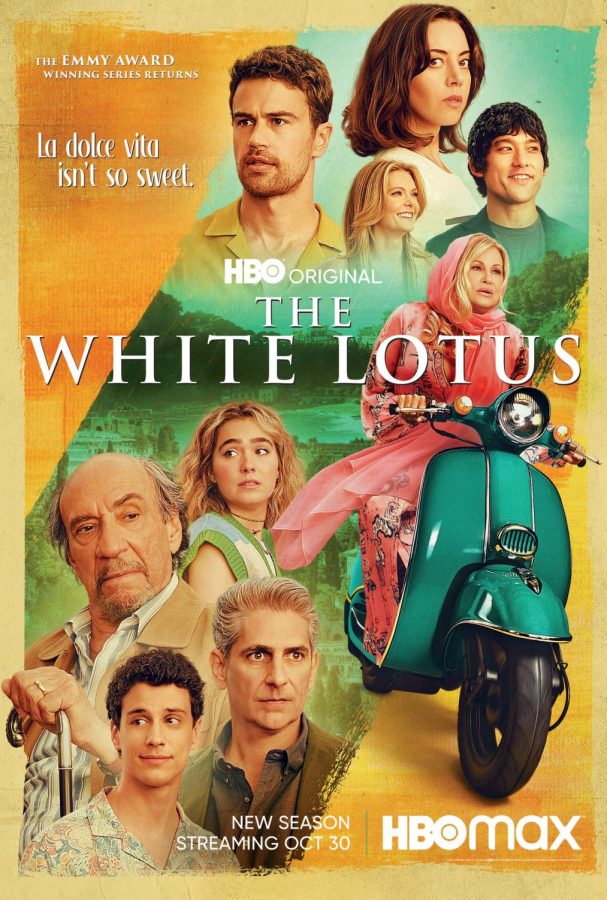“The White Lotus” Review (Season 2)
Dec 29, 2022
Mike White’s hit HBO television series, “The White Lotus,” has finally returned with a second season.
The show typically revolves around various characters arriving at a luxury hotel (the White Lotus) and the events that occur during their stay. These elites bring drama and secrets to their vacation, making tensions high throughout the runtime.
The employees of the White Lotus are also included, providing a stark contrast between classes and additional turmoil.
I have included some light spoilers, in case you’re planning on watching.
Maybe I’m just slow, but I constantly was expecting the plot to go a certain way, and immediately was thrown in a completely different direction. The relationship between Portia and Albie (with the addition of Jack and Lucia) is an amazing example of White reminding his viewers to never assume anything.
I will always be a fan of writers slowly revealing deep, scandalous information about secretive characters, until so much dirt is out in the open, complete chaos ensues. That is “The White Lotus” summed up.
The characters are the heart of this show. Its entire plot revolves around conversation– the way we interact with one another, assumptions and calculated actions. Therefore, I have to break down each character individually.
Jennifer Coolidge shockingly topped her Emmy winning performance from last season. The quirkiness of Tanya is indescribable. She’s so odd, I shifted from wanting to smack her, to wanting to protect her using my body as a human shield.
To go in-depth on Tanya’s journey throughout this season would give away too many spoilers. I will say, however, that her final scene in the finale had my jaw on the floor.
It was refreshing to see Aubrey Plaza in less of an Aubrey Plaza-y role. I think her performance as Harper is one of her best yet.
The relationship between Harper and Daphne was fascinating. One can only compare Daphne and Harper to their foil, Lucia (played by Simona Tabasco) and Mia (Beatrice Grannò).
Both Lucia, a sex worker, and Daphne, a housewife with a cheating husband, manipulate the men in their lives to benefit them sexually and monetarily. Mia and Harper are slowly introduced to this world, and grow dangerously attached to the power they find.
I love the concealment of what actually occurred between Harper and Cameron. We never truly see what went down, and yet, it doesn’t matter, because the events at the White Lotus only brought Harper and her husband closer.
This was the first I had ever seen Meghann Fahy and now I want to watch everything she’s ever been in.
She was captivating on screen. Her character Daphne perfectly defies the stereotype of the helpless ditzy housewife. Seeing Daphne reveal her true cunning intelligence was chilling.
Another aspect of “The White Lotus” that is left unrevealed is Daphne and Ethan’s promenade onto Isola Bella, an island off the beach of the resort. Both are obviously hurt by their spouses’ supposed infidelity.
Daphne says, “You do what you have to do not to feel like a victim of life,” then leads Ethan out to the island with an intimate gaze.
This would all suggest that Ethan and Daphne have sex. Maybe all this cheating gave Ethan newfound vigor creating the final conclusion of his and Harper’s story.
Theo James marry me challenge! This man can do no wrong, even though his character Cameron is crazy. First, his various assertions regarding workers’ rights in the first episode set off so many red flags I thought I was in Switzerland!
He proceeded throughout the show to say the most blatantly arrogant, obnoxious statements about wealth and his place in society. It was perfect.
Clearly, this season is about masculinity, and Cameron acts as the absolute worst-case example of toxic manhood.
He curses the world for being offended by his offensiveness, cheats on his wife, and is terrified of more powerful men.
In the fifth episode, Ethan says to Cameron, “I know what you’re doing. If someone with higher status wants something, you want it too.”
This, again, points to Cameron’s toxic masculinity and also sheds light on how stressful and cold that mindset truly is. He is willing to ruin his best friend’s life in order to feel superior.
Ethan (played by Will Sharpe) never technically does anything wrong, however, his major fault is never saying how he truly feels. This fear of revealing emotions is another pillar of modern masculinity.
Ethan spends his time at the White Lotus being pushed around by Cameron. When Cameron suggests they party with hookers, Ethan doesn’t know how to argue.
The same goes for his relationship with his wife. Harper is pleading for him to show some form of intimacy, and Ethan just can’t seem to do what he wants until the finale.
The bully dynamic between Ethan and Cameron is another depiction of toxic masculinity in action. Thankfully, in the finale Ethan escapes this destructive pattern.
I relate to Portia, Haley Lu Richardson’s character. She yearns to do something notable in her life. Portia is distressed by the time she spends on her phone, a dread many younger generations face. Her career seems like a dead end.
It seems by the end of this season she’s achieved her goal of experiencing something significant. She’s also been relieved of her position with Tanya, so hopefully, she’ll feel free to explore new opportunities.
I’m gonna be honest, I didn’t care that much about Mia or Lucia. I appreciated what they contributed to the theme of this season, and Lucia’s twist at the end was surprising, but that was about it.
Valentina (played by Sabrina Impacciatore) was also a boring character when compared to Armond, the hotel manager from season one. I liked her relationship with Mia, and that was about it.
The Di Grasso family depicted a range of masculinity throughout three generations, showing how much our age influences these social structures.
Bert (played by F. Murray Abraham) represented a Baby Boomer perspective. He flirts with every girl he passes and reminisces on the good old days when men could sling around guns, cheat on their wives, and return home to a hot meal.
Dominic (played by Michael Imperioli) is slightly, barely, better than his father. He cheats on his wife, creating nearly irreparable damage within his family. His daughter and wife have turned on him completely.
Dominic, however, redeems himself by donating money to Lucia, as Albie promised to help his father earn back his wife’s love.
Adam DiMarco was superb as Albie. When I first saw him on screen I thought, “Oh no, the guy from ‘Radio Rebel,’ he’s gonna suck,” however, I was mistaken.
Did I want to slap this man throughout the entirety of the fourth episode? Yes. Did he earn back my love? Same answer.
I hate a static character, and almost nobody in “The White Lotus” is one, Albie included.
It is interesting to consider whether or not Albie was truly a perfect example of masculinity. Of course, he wasn’t.
Albie certainly matches the nice guy trope– the guy who complains about girls never wanting him because he’s too polite when really, they just don’t find him attractive.
In the second episode, Albie says to Portia, “Girls always complain that guys aren’t nice, but then if they find a nice guy, they’re not always interested.”
This statement is ironic considering Portia promptly loses interest in Albie after meeting Jack.
I believe Albie is complicated though. He believed in Lucia’s goodness, helped her in a time of need, and could accept when she played him. Albie is aware of his father’s poor decisions and hopes to change the trajectory of his family.
“I just don’t wanna be like my dad,” he says in episode two, “I refuse to have a bad relationship with women.”
Overall, it was incredible how much horror and tension White created within such a romantic setting. I think I’ll be unpacking this season for a long time!

